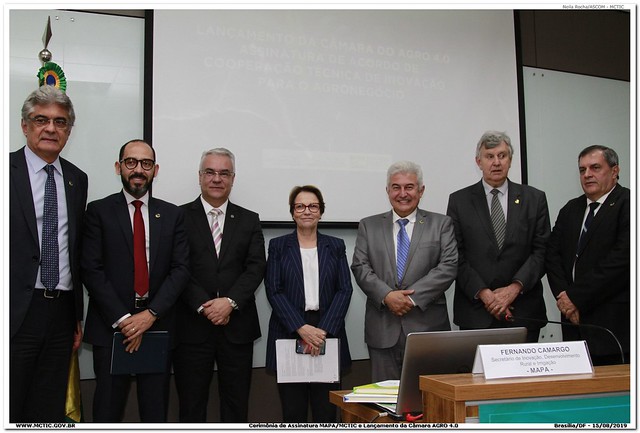O Ministry of Science, Technology, Innovations and Communications (MCTIC) it's the Ministry of Agriculture, Livestock and Supply (Map) signed this Thursday (15), in Brasília (DF), a technical cooperation agreement with the objective of promoting actions to expand the internet in the countryside; productivity increase; fostering innovative technologies and services; and Brazil's positioning as an exporter of Internet of Things (IoT) solutions for agriculture.

The agreement also establishes the creation of the Chamber of Agro 4.0, as part of the National Plan for the Internet of Things. The idea is to have a debate body with the participation of government, companies and academia to build a strategy for connected farms, which use solutions such as automation, interactivity, real-time monitoring, Big Data, among others.
According to the MCTIC minister, Marcos Pontes, linked entities such as CNPq, Finep and Embrapii are important tools to support research and innovative companies in agribusiness. The internet connection in rural areas can be reinforced with initiatives from the ministry and the approval of PLC 79.
“We have a connectivity project that uses optical fibers. The first stage will be the Northeast, then the North and Midwest. We also have the Geostationary Defense and Communications Satellite (SGDC) taking internet to points where fiber does not reach. The connection depends on infrastructure and we expect the PLC 79 to help us expand access. We are talking about R$ 20 to 40 billion investment”, he said.
The Minister of Agriculture, Tereza Cristina, highlighted the role of technology in guaranteeing productivity increases in Brazil allied to the preservation of nature. “The National Supply Company (Conab) announced a record crop in the country, an increase of 6% in production with growth of 0.6% in the planted area. This was done with a lot of research and we have to show the world that we produce while maintaining sustainability. It is no wonder that research and innovation will be increasingly used,” he said.
Senator Luis Carlos Heinze (PP/RS) spoke about the need to increase the number of innovative companies in the field. “We have 307 agro startups in Brazil, while there are more than 20,000 in other sectors. A state like Mato Grosso, the largest producer in Brazil, must have between 10 and 12. We need to link students in Agronomy, Animal Science, Veterinary Science to universities and companies in the field. We have enormous potential in encouraging these kids to develop new projects,” he said.
Agro Chamber 4.0
The Agro 4.0 Chamber will have the coordination of MCTIC and Mapa and the participation of actors from the private sector, academia and research institutes to compose the working groups. There will be four WGs to debate and present solutions in the areas of Development, Technology and Innovation; Professional development; Production Chains and Supplier Development; and Connectivity in the Field.
The agency is part of the National Plan for the Internet of Things, formalized through a decree in June, with the aim of strengthening the national innovation ecosystem and the development of Internet of Things projects. In addition to Agro, the Chamber of Industry 4.0, inaugurated in April, and the Chambers of Health 4.0 and Cities 4.0, which should be launched soon, are part of the Plan.












